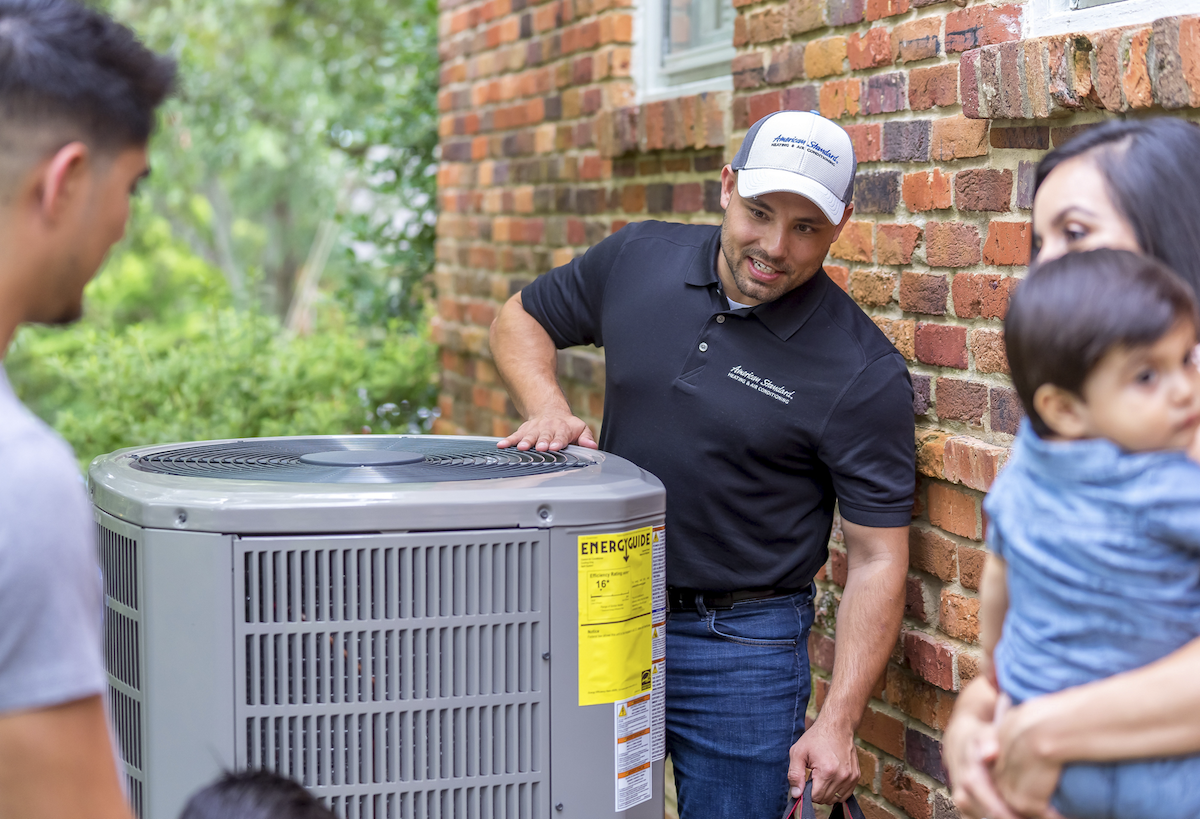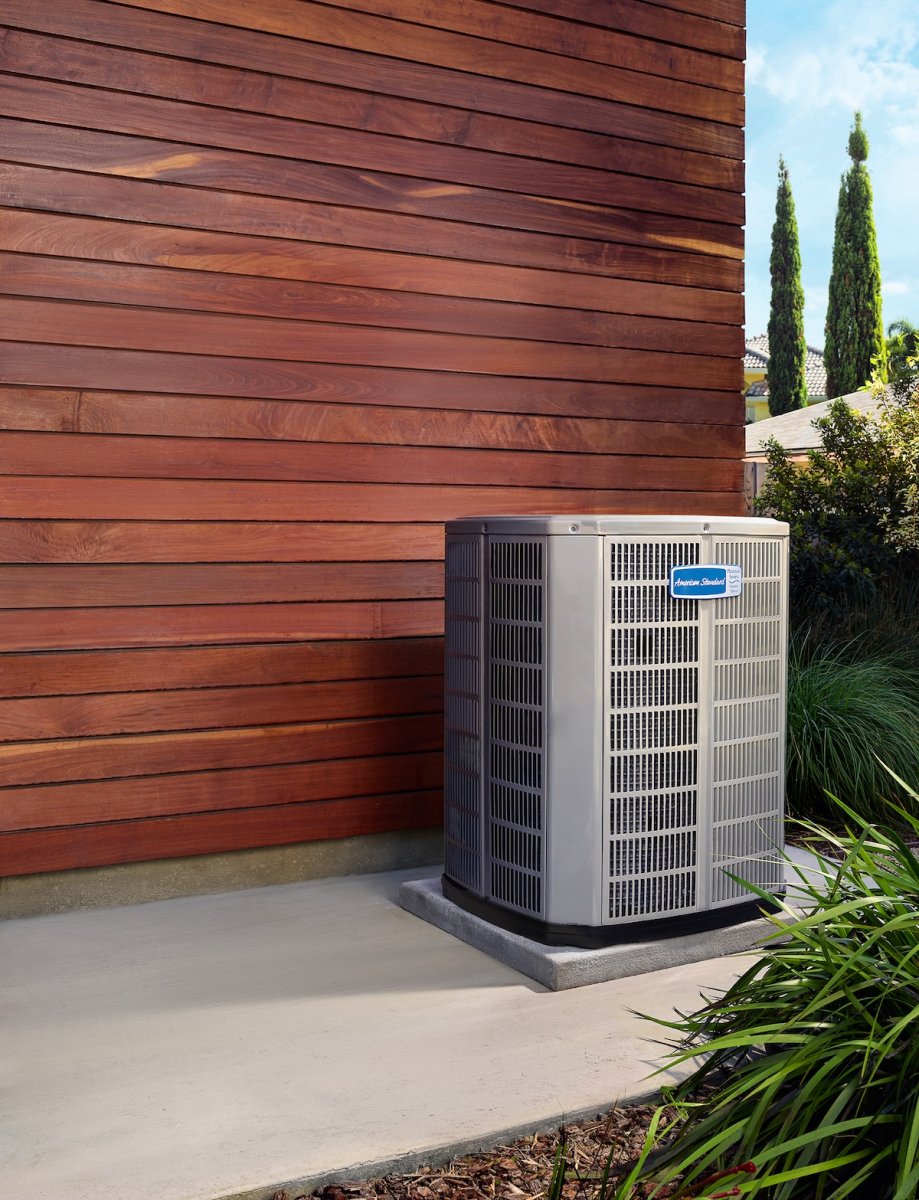

We may earn revenue from the products available on this page and participate in affiliate programs. Learn More ›

Partner Story
Heat and cool your home more efficiently with an American Standard heat pump, which can offer cost savings and improved comfort.
Walk through any neighborhood across the country and you’ll likely hear conversations about heat pumps. This once-niche heating and cooling technology has suddenly captured widespread attention as homeowners discover its potential to slash energy bills while providing year-round comfort. With rebates and tax incentives making installation more affordable, new cold climate models proving their efficiency even in harsh winters, and energy costs on the rise, heat pumps have become a popular choice for homeowners.
We consulted with Mark Woodruff, senior product manager, ducted outdoor at American Standard, to discover why heat pumps are trending and some of the unique benefits they offer.
The heat pump market is booming.
Industry data highlights the momentum shifting toward heat pumps, says Woodruff. Heat pumps now represent the most-deployed home heating solution globally, according to the World Economic Forum’s 2024 report, Fostering Effective Energy Transition. In the United States, during the first 11 months of 2024, Americans bought 37 percent more air-source heat pumps than gas furnaces. Additionally, data from the Rocky Mountain Institute shows that annual heat pump sales in the country increased 115 percent from 2004 to 2024.
“In several regions of the country, heat pumps have already surpassed traditional air conditioners as the preferred system for homeowners,” notes Woodruff. “This trend reflects both consumer demand for energy-efficient solutions and the growing availability of rebates and incentives that make heat pumps more accessible. Combined with their ability to provide both heating and cooling, it’s clear why heat pumps are quickly becoming the system of choice nationwide.”

Heat pumps provide a plethora of benefits.
Heat pumps, such as American Standard’s AccuComfort Variable Speed Platinum 20 Heat Pump, have received a substantial amount of attention in recent years since they can heat and cool your home in an energy-efficient, eco-friendly way while lowering your energy bills and improving the comfort of your home. Here are additional heat pump benefits to keep in mind when deciding to install your next HVAC appliance:
Current models are now effective even in very cold climates.
While heat pumps used to get a bad rap for not being able to perform in frigid temperatures, that is no longer the case. Thanks to advances in technology over the past couple of decades, some heat pump models, referred to as cold climate heat pumps, can operate effectively in temperatures as low as -20 degrees Fahrenheit.
Cold climate heat pumps are built to function, be durable, and maintain efficiency in temperatures well below freezing. They include special features, such as enhanced defrosting, variable speed compressors, and vapor injection.
In most winter climates, it’s now possible and more efficient to use a heat pump for home heating rather than a furnace. In fact, more than 115,000 heat pumps have been installed in Maine, one of the coldest states in the U.S.
Heat pumps are easy to install.
One of the advantages of heat pumps is that their installation process closely mirrors that of traditional HVAC systems, says Woodruff. Ducted heat pump systems attach to existing ductwork and refrigerant lines. Ductless heat pumps are also simple to install, as they don’t require any ductwork.
This makes heat pumps straightforward for technicians who are already trained in air conditioners and furnaces. “This similarity not only streamlines installation but also ensures that ongoing service and maintenance are familiar and approachable,” explains Woodruff. “For homeowners, this means fewer barriers to adoption, faster project timelines, and confidence that their local contractors are well equipped to handle the job.”
Heat pumps are cleaner and safer than other HVAC options.
“Heat pumps offer an added layer of peace of mind because they don’t rely on combustion to generate heat,” explains Woodruff. “For homeowners, this makes heat pumps not only an efficient choice, but also a safe and worry-free option for year-round comfort.” Given the research regarding short- and long-term health effects from burning fuel in a home, such as asthma, chronic respiratory issues, and headaches, it’s safer to switch to a heat pump.
Maintaining heat pumps is straightforward and convenient.
Heat pumps require minimal maintenance and tend to have a long service life. Modern heat pump units have an average life span of 10 to 20 years, yet can last up to 25 years with regular maintenance.
Overall, maintenance for heat pumps is similar to that of traditional HVAC systems, which makes them easy for both homeowners and service professionals to manage, says Woodruff. “Homeowners can expect the same routine needs—such as changing filters, checking coils, and scheduling seasonal tune-ups—to keep the system running efficiently,” he explains. “Because the process is so familiar, technicians don’t need special training, and homeowners don’t face any added complexity.”

Now is the best time to take advantage of incentives.
Woodruff links the growth in the market to the wide range of rebates and incentives available to consumers for purchasing heat pumps. “This makes upgrading to a new system more affordable than ever,” he explains. “Even in colder climates where propane is common, homeowners can significantly reduce their fuel usage by letting the heat pump handle much of the heating load, ultimately lowering monthly energy bills while still staying comfortable.”
If you are thinking about installing a heat pump, such as the American Standard AccuComfort Variable Speed Platinum 20 Heat Pump, don’t hesitate. You have until December 31, 2025, to take advantage of federal tax credits provided through the Inflation Reduction Act (IRA) for clean-energy and energy-efficiency upgrades to your home. These incentives are expiring due to changes made in a recently passed tax and spending law.
You might be eligible to receive 30 percent off the total cost of your heat pump, including installation costs, up to $2,000 per year. Heat pumps must meet Energy Star’s Most Efficient criteria for the year they’re installed (search in the Energy Star product database). Both electric and natural gas heat pumps are eligible, and both renters and homeowners can claim this credit.
When the federal incentives expire, you can still take advantage of state and local opportunities that may be available. Here are some helpful resources to help you find additional rebates and tax incentives for heat pumps:
- Database of State Incentives for Renewables & Efficiency from N.C. Clean Energy Technology Center at N.C. State University.
- Incentive Calculator from Rewiring America, the leading electrification nonprofit.
- Check your state’s energy office or Department of Energy website.
- Contact your local utility company, as many utility providers offer their own rebates to encourage energy-efficient upgrades.
For additional information surrounding heat pumps please visit www.americanstandardair.com or contact your local American Standard dealer.
